Steins; Gate (2011) Review: Time Travel and Weirdness

A story that includes microwaved bananas, a boy who looks and behaves like a woman, and a self-proclaimed mad scientist who seeks to “transform the world’s ruling structure.”
Strange enough for you yet?
Adapted from the second visual novel of 5pb. and Nitroplus’ Science Adventure series, Steins; Gate is a sci-fi thriller that keeps its viewers at the edge of their seats, shocks them in ways that leave them speechless, and moves them with the sincerity and growing bonds of the main characters.
While the subject of time travel is certainly not ground-breaking (as seen in notable live-action films such as the Back to the Future trilogy, 12 Monkeys, and Looper), it is not often you encounter an anime that delves into dark territory without it coming across as forced or contrived for dramatic effect. Even the short speech the protagonist makes at the beginning of this show—a feature you can find in many anime—is not spoken for the sake of sounding “deep,” but rather to comment on his later decisions and the inability of escaping fate.
While certainly not without its own flaws—or features which may deter certain viewers—Steins; Gate is truly a rare piece of work among the vast heaps of shows the anime industry pumps out every year. The characters are unique—for the most part—, the plot is complex and very well-executed, and each episode is packed with numerous details where even the most insignificant objects, events, or pieces of dialogue prove important. As a result, this is a show that requires its viewers’ utmost attention at every moment.
Below is the English-subbed opening sequence for the show:
Story and Structure
Set in Akihabara, Japan, the first moments of the show introduce viewers to a man, Okabe Rintarou, wearing a white lab coat and supposedly speaking with someone on his phone. After his childhood friend, Mayuri Shinna, interrupts him, the two of them head towards a conference that discusses successful time machine development. Within the first few minutes, Okabe is angered after reading the speaker’s pamphlet, claiming Dr. Nakabachi had ripped off John Titor’s time machine theory—John Titor being a self-proclaimed time traveler who had posted the same theory in the year of 2000.
Before Okabe’s conflict escalates further, he is led out of the room by a girl, Kurisu Makise, who is very interested in finding out who Okabe is. She claims that Okabe had tried to say something to her 15 minutes ago and that he seemed very distressed when he had approached her. Okabe, however, does not remember doing so and finds an excuse to leave her. A short period of time later, while Okabe is speaking with Mayuri, the two of them suddenly hear someone screaming. Immediately running to the source of the scream, Okabe discovers Kurisu Makise lying in a pool of blood.
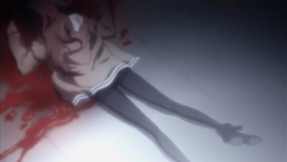
At this point in the episode, viewers are most likely to assume that this event is what the entire story revolves around, yet this could not be further from the truth. One of the things that make this show so impressive is its ability to balance multiple elements of the overarching story—Kurisu’s death being one of several major events to occur within the first episode, let alone the show as a whole. And while it is later revealed that everything has been moving towards a single event, all of the sub-plots prove significant not only in terms of the value they have for the main story, but for the emotional weight they bear for their own characters and their relationships to Okabe as well. However, because this is a show with a large cast of characters, involving several subplots, each episode is fairly dense in terms of the information and details in it, which subsequently affects the pacing.
For an anime that is only 24 episodes long, and that expects its viewers to pay close attention at every moment, the first 11 episodes may feel like 15-20. Viewers may point to this as a flaw, especially considering that it falls under the thriller genre, but speaking from what viewers have said on multiple anime forums, subreddits, and my own personal experience, if you have the patience to stick it out until episode 12, you will be heftily rewarded.
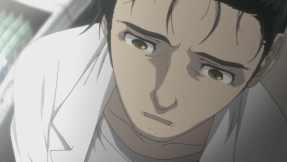
Steins; Gate is not a show that relies on cheap twists and nonstop action to create a riveting experience for its audience; it is carefully crafted and builds gradually to one of the most shocking moments of the show, thereafter following on the same destructive, faster-paced path until the issue is resolved—though not without irrevocable psychological and emotionally-scarring consequences. If viewers are looking for an anime that becomes more dark, mature, and surprising as the show progresses, then Steins; Gate is a solid pick.
Characters and their Development
During the first two episodes, all of the main characters are introduced: Okabe “Okarin” Rintarou—the childish, considerate, self-proclaimed mad scientist; Mayuri “Mayushi” Shiina—the sweet and innocent cosplay costume designer and Okabe’s childhood friend; Kurisu Makise—the level-headed, rational, slightly insecure, science genius; Itaru “Daru” Hashida—the overweight, perverted, stereotypical otaku and close friend of Mayuri and Okabe; Moeka Kiryu—the socially awkward girl who cannot bear to be parted from her phone; Ruka “Rukako” Urushibara—the highly feminine male and close friend of Mayuri and Okabe; Faris Nyannyan—the waitress at a maid-café and friend of Mayuri and Okabe; and Suzuha Amane—the spunky, carefree part-time worker of Mr. Braun’s.
With such a large and diverse cast as this, viewers may find themselves dubious to the idea that each one is given ample enough time to fully develop as characters. While the show certainly does employ the use of stock characters—the most obvious probably being Daru, the stereotypical otaku—practically every single one receives a lot more attention than viewers may have originally expected. Perhaps one of the most satisfying parts of the show is watching how certain characters you may have found annoying, or who you simply didn’t find interesting at first, become endearing. And while certain characters do receive more attention, naturally as a result of the story’s focus, everyone is given enough attention to be perceived as full-fledged, identifiable people in the viewers’ eyes.
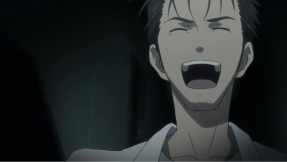
However, for those viewers who are quick to judge characters and the script of a show within the first few episodes, its unique brand of “weirdness” may be off-putting. By this I mean that viewers may find themselves feeling awkward at various points during the first half due to the characters’ idiosyncrasies and the dialogues exchanged between them. Part of the reason for this is because the main character is a self-proclaimed mad scientist who enjoys forced evil laughter, constantly pretending to be talking on his phone with someone about an agent sent after him by “The Organization,” and whose close friends enable his childish behavior, or even actively reciprocate it in some cases.
On the one hand, this feature of the show presents a realistic depiction of friendships and how one’s weirdness is often accepted by those who enjoy another’s company. It is important to note though that this is not done simply for the sake of being “different,” but for the sake of painting an honest and genuine presentation of people as they truly are—and that involves seeing them not only when they appear most “ordinary,” but when they let their guards down enough to simply be themselves. As it is difficult to reach a general consensus on this, I will leave viewers to decide for themselves.
Aesthetics and Conclusion

In terms of the overall look and feel of the show, despite how light the outside is depicted, the show has a strong dark, brooding feel to it from the very beginning. Whenever the city is portrayed, it is often bright gray—approaching white—and the lack of music at various extended moments is broken by the sound of cicadas—especially when the past or future suddenly flash on the screen as still-frames. This method of blending the present with distant events adds to the somber, reflective mood of the show. The only instances when “color” does appear is not in the cityscape background, but in the light-hearted tone of the characters’ dialogues during the first half of the show.
In terms of music, it is rarely heard. Most of the time, the show relies purely on the characters’ dialogues to fill the emptiness or the sound of minor background noises—like the typing of keys on a keyboard, the sound of footsteps against pavement, and the like. The only times when music is used is to enhance the eerie atmosphere surrounding bizarre or horrifying events/information, during which time orchestral music is employed. Thus, the soundtrack’s infrequent appearances makes the few instances when it does show itself all the more powerful.
For veteran anime watchers: If you are looking for a story that gives an honest portrayal of people, their vulnerabilities and wants, as well as a complex and well-crafted thriller, then you will greatly enjoy Steins; Gate. Whether or not you have the patience to stick with it until the 12th episode, however, will strongly shape your impression of the show.
For non-anime watchers: You do not need any prior knowledge or viewing experience of anime in order to enjoy this show. The first half is filled with light-hearted humor and set-up, while the second half is significantly darker, dramatic, and fast-paced. And if you enjoy a little bit of romance on the side, this show will give you that as well. Whether or not you are willing to stick with it, though, until the 12th episode will shape your overall impression.
Rating:
What do you think? Leave a comment.




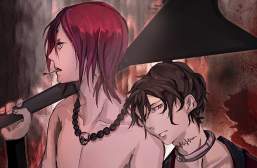


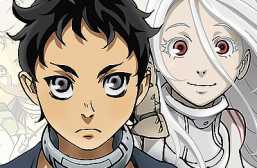


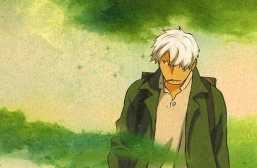
Steins;Gate had me interested from start to finish. I pretty much liked every bit of it and is by far the best show this year I’ve seen so far. Okabe Rintarou was a very likeable main character, the constant paranoia, talking to himself and such got me laughing a lot. Kurisu~tina was awesome, actually every single character was developed really well. The voice acting was superb.
Glad to hear you enjoyed it 😀 thank you for the read!
The anime was outstanding and among my favorites, love me some mind bending shows.
Agreed, it’s one of my favorites as well 🙂 thanks for the read!
I very much enjoyed the anime, but holy fucking shit, did it start off slooooooow.
Yup, the first half is almost entirely set up, with a gradual build up of suspense, but the second half definitely makes it worthwhile, thanks for the read!
Nice anime but Primer is probably my favorite time travel story. Amazing that they pulled it off with almost zero budget.
What really made me mad was towards the end of the show when Okabe was trying to prevent Mayuri’s death. First off, why is he always trying to save her at night by keeping her out in the open. They could have run one plot line with him keeping her holed up at a hotel or a night club with lots of witnesses and still let her die and I would have been satisfied. Having a little kid bump her into a subway train (where’s FB?? letting his daughter roam the subway at night?) or having her be run over by cars in dark alleys (common in Japan??) was just stupid.
The whole show started with Kurisu’s death, which turns out to be a bit of a stinker. Her dad is nuts and loves to stab people including his own daughter? A little far fetched and I totally called Okabe stabbing her when he was waiting in the room. And why is that whole inside of the building darker than night? Yes, daddy please meet me in the dark room on a floor where nobody is…
I agree about most of your points. But the one about her holed up somewhere didn’t matter. As he said “no matter what, the world made sure she died”. I kept thinking “why don’t he put her in an iron box so she can’t get shot” or something similar but it really wouldn’t matter. And in a way, it would be a waste of time watching. But ya, the girl getting excited and accidentally pushing her made me scratch my head… They should’ve showed FB there.
@Darryl
Part of the reason why Okabe and Mayuri are “out in the open” as you say is because he tries to get her as far away from the lab as possible—they can’t hole themselves up anywhere within Akihabara, because as you may remember, Kiryu’s people were watching them (the fact that Okabe had received multiple messages on his phone warning him about his hacking into SERN suggests that he was under CONSTANT surveillance)—so staying in one place, regardless of where it was within Akihabara, would have been a bad idea; this is why he tries to get Mayuri out of the city by trying various modes of public transportation. As Sean pointed out in his response to your comment, the primary reason that Mayuri was killed from all these events, no matter what Okabe tried to do, was to show viewers that no matter how much the individual may struggle, fate is an insurmountable force. As to your question about why FB’s daughter is running around in the subway, I think you can assume that she was either hanging out with friends, or her father was somewhere nearby—the writers probably assume that they don’t need to explain every little detail in order for the viewer to understand why someone was at some place when something happened—especially with such a minor character when you can come up with a number of logical explanations as to why she was there. Also, your comment about there being cars in dark alleys—of course it’s highly probable that a random citizen would not find themselves driving their car in dark alleyways. However, from the way the show is directed, the person driving the car seemed to have direct intent in hitting Mayuri and Okabe—so you can logically deduce that this was probably another one of Kiryu’s spies. And in terms of the storyline with Kurisu’s father, I think it’s a fair statement to say you never know what a person is capable of. Everyone has their struggles, their faults, their own emotional baggage, etc., and maybe he had finally snapped. I think you can tell from the very beginning of the show that he isn’t the most “moral” person, and jealousy can be a very powerful force when the person inflicted by it gives into his or her own desires. I hope this answers your questions about the show, and thank you for your comment.
The ‘inevitable’ thing that some time travel fictions do is always a bit shaky. It seems like there’s always some obvious way of avoiding, and when there isn’t it becomes a bit contrived and Final Destination-esq. It would make sense if fate had some kind of sentience or agency, but treated as a scientific law (like this show does) it seems a bit of a stretch that all these coincidences would occur, and the more you examine them the more implausible it becomes. I think they didn’t focus on it for this reason, we just have to accept this (non-contradictory) principle of fate but not look at it too closely.
I also agree that her father’s character was a very lame caricature. The show gives its other ‘evil’ characters some even-handed rationale (Shining Finger, FB) but for her father to be merely an evil psychopath, that is pretty lazy writing.
So I agree with your criticisms, although they stem from weak writing are aren’t plot holes per se.
It’s easily one of the best anime I’ve ever seen. Granted I’ve only seen about 75 of them. While I’m sure others have seen hundreds if not a thousand. But, from the ones I’ve seen. This is easily right up there with the best.
I wish this aired on free to air so doctor who and sci fi fans in general could watch it. It seems like one of those gateway titles
Nice work on the article too 🙂
@Trank a lot of anime fans would probably agree with you. Glad to hear you enjoyed it :). @Jordan, thanks! “gateway” is probably one of the best ways to describe the show for people who are new to anime–you really don’t need to have any prior experience to enjoy it
3-4 years already. When you look back you realize that time goes so fast it’s scary. I watched this anime back in the day, and I enjoyed it but it didn’t blow me away. Most of it was super boring and generic till the major plot twist happens. And even then it was nothing we haven’t seen a thousand times already on most time travel storylines on anime’s like Madoka or movies like A Butterfly Effect, Source Code, Looper and that new Tom Cruise film based on the manga, All You Need is Kill (aka Edge of Tomorrow). Same plot device every time. It kind of loses its impact after seeing it so many times.
All thrillers rely on a major twist that occurs at some point during the story, and as I mention at the beginning of my article, the genre of thriller and the subject of time travel are not “ground-breaking” for Steins; Gate. What I attempted to get across in my review was that Steins; Gate is specifically exceptional for an anime–particularly for how dark (even disturbing) the themes are—which is not something you come across that often in anime without it being forced or contrived. If your viewing experience with this show was not to your expectations, then perhaps the thriller genre in general is not something that personally appeals to you since they all follow a particular formula, that as you mention, does not impress you. What I believe appeals to viewers of this show is that Steins; Gate deviates from certain thriller norms particularly because it does not depend on numerous twists and suspense in order to create drama, but rather it uses in-depth depictions of its characters—the thriller aspect being less emphasized. Thanks for the read!
i watched the first episode recently and saw something wired to what looked like a microwave. is that what they use to go in time or something? if so, i think i’m gonna be careful what microwave i put my hot pockets. i’m gonna continue to watch the anime since i’ve only seen some of the first episode and hope it keeps my attention.
i own the anime and its great, one of my favorites.
glad to hear you enjoyed it 🙂
The characters were interesting. The plot wasn’t that bad. They pulled off a decent telling of a time machine story line.
This series should have ended on episode 22 when Kurisu died. It gives time travel more of a devastation effect on a person’s personality. For example Okabe, even though time already has a predestine schedule, he continuously jumps to try to save his friends. This alters him personality from his fun jokingly evil genius to his devolve methodical self.
However, although there are many plot holes in the story, it is still well crafted that make it worth watching twice.
I agree that the series went on about 2 or 3 episodes too long. Personally I don’t really mind that he saved Kurisu as it was fairly clear from the start that her death was time travel related (the first thing she ever says to him aknowledges that she’s just met a previous version of him), but they sure dragged it out. Did we really need an entire episode of him going to America just so they could reiterate what the ending of episode 24 implied; that she will get her memories back.
It’s a masterpiece no doubt. After I finished this anime I was kind of just sitting there stunned. Deserved 5 stars, not 4 🙂
XD If I were to “personally” recommend it, I would definitely give it 5/5; but I had to factor in a few things that others might point to as flaws in the show, so objectively I couldn’t do it 😛 . But I agree, I love this show.
Literally just finished the Steins;Gate anime less than an hour ago. Great review.
Thank you so much! Glad to hear that you enjoyed it 😀
i have yet to watch SteinsGate but ive heard for an anime watching veterann it will satisfy me
Most definitely it should! 🙂
My main problem with Steins;Gate lies in the pace still. Yes, it’s a great reward if viewers do stay put until episode 12…but the problem is they shouldn’t have had to wait that long to get fully engaged in the show. Moments of silliness among Okabe and his friends are nice, but they become excessive during ep7-12. There are also things that aren’t fully explained, such as how Okabe and Daru become that good of friends, or why Okabe treasures Mayuri that much apart from the brief mention that they are childhood friends.
It’s certainly not a perfect show. I’ve only seen one anime that I think is absolutely flawless (Shinsekai Yori), but I do think the show sets itself apart from the generic wave of anime that arrive with each season. For example, I took a look at all of last season’s anime and all of them do not even come close to something like Steins; Gate or Hyouka or any of the other few anime out there that are objectively standouts. Again, Steins; Gate isn’t perfect, but is it exceptional comparatively speaking? I very much believe so. Thanks for the comment Justin!
Haha I don’t expect it or any show to be perfect. If perfection is our standard then there’s no point in discussing any show, right? Yes it’s better than most shows in recent seasons, though I don’t see how that relates to my criticism of the show.
My comment was relevant to your criticism since your criticism points to aspects of the show that you found to be flawed, while my comment acknowledges that your complaints are for the most part well-grounded. The reason why I went on to say that I believe Steins; Gate is exceptional is because that is the main take-away I want readers of my article, and viewers of the show, to have. Moreover, if anyone who hasn’t seen the show happens to scroll through the comments section and read about your experience with it, they might find themselves less inclined to watch it as a result—so my response to your comment was both a reply to your criticism and an encouraging note to others not to dismiss the show completely because of a few faults.
Good review. IMO, the only good anime that has come out in the past few years. and the only intellectually stimulating one( like Death Note and Code Geass). Did take me a long time to get into it because of the slow, initial episodes.
Glad to hear you enjoyed it 🙂 thank you for your comment!
Was that the best writing ever. Best anime of 2011, maybe of the last couple of years.
Glad to hear you enjoyed it 🙂 and thank you for your comment!
The influence of Primer on the conceptualization of the series is quite apparent (and I believe even admitted): a seemingly innocuous, limited form of time travel is accidentally discovered by inventor experimentation, but ultimately leads to drastic consequences. The hard shift from lighthearted, almost spoof comedy to serious drama halfway through the series may be seen by some as a flaw in pacing, but it makes the shift that much more shocking and impactful.
The series also draws in obscure elements of real-life internet myth/culture (which contemporary viewers may not even be aware of) in the form of John Titor and the IBM 5100.
Steins;Gate is steeped in Japanese idiosyncrasies, but manages to not be held back them, still easily appealing to an international or more casual (as opposed to hardcore anime) audience.
This show was phenomenal. I definitely remember the first few episodes feeling dragged out but as you said, it was definitely worth the wait. The entire show was just full of twist and turns. Personally, the transition from a goofy show to a very serious and personal drama was what got my attention. By the end, everything started getting a little blurry for me and my nose was feeling stuffy. Must have been allergies. This was a great review though!
Much appreciated man! 🙂
Steins;Gate is such an amazing series! One of my favourites and I’m also glad I stuck with it considering how slow it started off. I read earlier, on this anime blog, that Robotics;Notes has a similar feeling/setting and references to S;G and am thinking of checking it out. Have you seen it, and would you recommend it?
Hmm, I’ve only seen the first episode a while back, so I can’t say whether or not it’s a good show. I do know that Steins;Gate and Robotics; Notes are both from Nitroplus and 5pb’s series of sci-fi stories (including the first Chaos; Head)–so if you enjoyed Chaos; Head and Steins;Gate, then odds are you’ll find something in Robotics; Notes that you’ll enjoy as well. I might end up reviewing Robotics; Notes in the near future, so if you want to wait until then, or look at other sites that have reviewed the show already, it’s up to you. Here’s one thing to consider though: Steins; Gate is probably the most well-known show out of the entire series, and if that is the case, then there’s probably good reason for that. For example, while I loved Steins; Gate, I could not stand Chaos; Head despite both taking place in the same universe and being from the same people. In short, it’s up to you whether or not you want to take the plunge into the show, but I can’t offer any advice at the moment 😛 .
Loved this anime. I never had a problem with the first 12 episodes. They were necessary for building the characters and setting. They also had a TON of foreshadowing of what was to come – something I noticed on my first watch but greatly appreciated on my second watch. It feels like a different story on a rewatch tbh.
Hyped for the new Steins;Gate 0 coming soon!
(http://www.animenewsnetwork.com/news/2015-03-28/steins-gate-0-follow-up-game-and-anime-teaser-video-staff-unveiled/.86476)
El Psy Congroo
This sounds like a fusion between science fiction and slice of life.